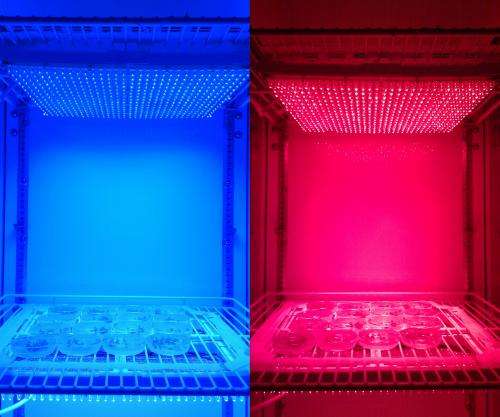Plants let chloroplasts know the time

(Phys.org) —Plant cells communicate information about the time of day to their chloroplasts, the part of their cells that underpins all agricultural productivity on Earth, researchers at the University of Bristol have demonstrated in a study published today in Science.
Plant cells contain an internal clock (the circadian clock), which is able to regulate cellular processes so that they occur at the optimal time of day, causing a big increase in plant productivity. As chloroplasts are the site of photosynthesis, their function is highly dependent on the daily changes in light environment.
It is thought that chloroplasts were originally free-living organisms that were incorporated into the cells of plants very early in plant evolutionary history. A result of this is that chloroplasts have retained some of the cellular machinery required to produce proteins from their own chloroplast DNA. An essential part of this machinery are 'sigma factors', and in present-day plants, they are encoded for by the cell's nuclear DNA.
The researchers were able to show that the production of sigma factors is controlled by the plant's clock. This enables the nuclear DNA to regulate the activity of chloroplast genes, and ensure that the production of proteins essential for photosynthesis is co-ordinated with daylight.
Lead author, Dr Antony Dodd of Bristol's School of Biological Sciences said: "This is a major breakthrough that provides a completely new perspective on daily circadian rhythms. We have learnt from this work that timing information moves between different parts of the cell, and in particular involves the chloroplast, which is the part of the cell that underpins all agricultural productivity on the planet. It's particularly fascinating that the process we identified makes use of genes that pre-date modern land plants and originates from the bacteria that gave rise to chloroplasts."
More information: 'Circadian Control of Chloroplast Transcription by a Nuclear-Encoded Timing Signal' by Noordally, Z., Ishii, K., Atkins, K., Wetherill, S., Kusakina, J., Walton, E., Kato, M., Azuma, M., Tanaka, K., Hanaoka, M., and Dodd, AN. in Science: www.sciencemag.org/content/339/6125/1316.short
Journal information: Science
Provided by University of Bristol
















